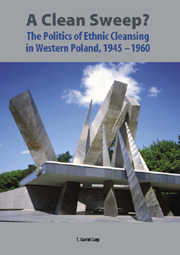Book contents
- Frontmatter
- Contents
- Acknowledgments
- Introduction: Hearts and Minds and Land: Ethnic Cleansing and the Stabilization of Postwar Poland
- 1 How the East Was Lost: Germany's Struggle for the Polish-German Borderlands, 1870–1945
- 2 Who Won the West: The Colonists and Ethnic Cleansers of Poznań and Eastern Brandenburg in 1945
- 3 Acts of Sacrifice: Poland's Ethnic Cleansing and the End of Political Pluralism, 1945–47
- 4 Counterrevolution from Above and Abroad: The Delocalization of Politics and the Beginning of Polish Stalinism's Antinational Counterrevolution, 1947–49
- 5 Waging Counterrevolution: The Party-State's Struggle for Hearts, Minds, and Land in Wielkopolska, 1949–53
- 6 Revolutions before the Revolution: National Solidarity and the Long Retreat of Stalinism in Wielkopolska, 1953–56
- 7 The Revolutions Betrayed? The Poznań Revolt and the Polish Road to Nationalist Socialism, 1956–60
- Conclusion: A Near Run Thing From National Solidarity to Solidarity
- Abbreviations
- Notes
- Bibliography
- Index
1 - How the East Was Lost: Germany's Struggle for the Polish-German Borderlands, 1870–1945
Published online by Cambridge University Press: 12 September 2012
- Frontmatter
- Contents
- Acknowledgments
- Introduction: Hearts and Minds and Land: Ethnic Cleansing and the Stabilization of Postwar Poland
- 1 How the East Was Lost: Germany's Struggle for the Polish-German Borderlands, 1870–1945
- 2 Who Won the West: The Colonists and Ethnic Cleansers of Poznań and Eastern Brandenburg in 1945
- 3 Acts of Sacrifice: Poland's Ethnic Cleansing and the End of Political Pluralism, 1945–47
- 4 Counterrevolution from Above and Abroad: The Delocalization of Politics and the Beginning of Polish Stalinism's Antinational Counterrevolution, 1947–49
- 5 Waging Counterrevolution: The Party-State's Struggle for Hearts, Minds, and Land in Wielkopolska, 1949–53
- 6 Revolutions before the Revolution: National Solidarity and the Long Retreat of Stalinism in Wielkopolska, 1953–56
- 7 The Revolutions Betrayed? The Poznań Revolt and the Polish Road to Nationalist Socialism, 1956–60
- Conclusion: A Near Run Thing From National Solidarity to Solidarity
- Abbreviations
- Notes
- Bibliography
- Index
Summary
In my village [the Germans] … destroyed and repartitioned completely seven farms, so that not even one stone remained, and the Germans became boastful and said to us: “Look, if we were not certain that we were going to win the war, we would not have done this.”
—A Polish peasant in Poznań describing the experience of his village during the Nazi occupationFrom the late-nineteenth to the mid-twentieth centuries, Poznań in western Poland was at the center of the Polish-German national struggle that culminated in the ethnic cleansing of East Central Europe after 1945. The chief causes of ethnic cleansing were the rapacity of German imperialism and the etermination of the Grand Alliance to cut through the Gordian knot of entangling ethnographic and political frontiers that so constrained politics in interwar Europe. Yet Polish society embraced the Grand Alliance's diktat to expel its German minority with enthusiasm. The Poles of Poznań took a leading role in rallying their countrymen to this task and in settling the former eastern territories of the Reich that the Grand Alliance awarded Poland at the end of the war. How and why did Poznań became the crucible for the creation of a new Poland and the destruction of eastern Germany?
Poznań was an unlikely graveyard for German colonial hopes in Eastern Europe, and Poznaniaks were unlikely gravediggers for Germandom in Poland. One of the ironies of the national conflict in Wielkopolska is that many Poles outside the region viewed Poznaniaks as barely distin-guishable from the Schwabs whom the Poles of Poznań would come to hate so deeply.
- Type
- Chapter
- Information
- A Clean Sweep?The Politics of Ethnic Cleansing in Western Poland, 1945–1960, pp. 13 - 33Publisher: Boydell & BrewerPrint publication year: 2006



